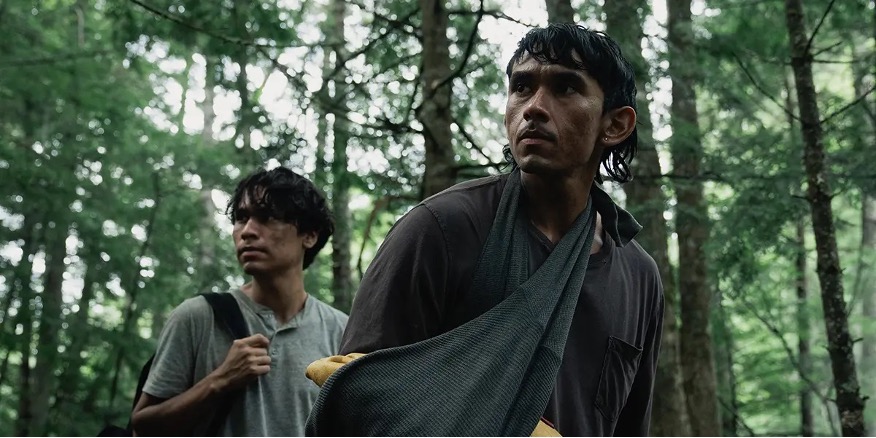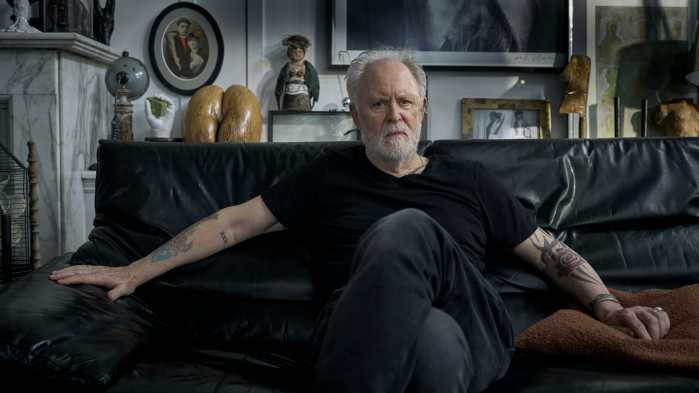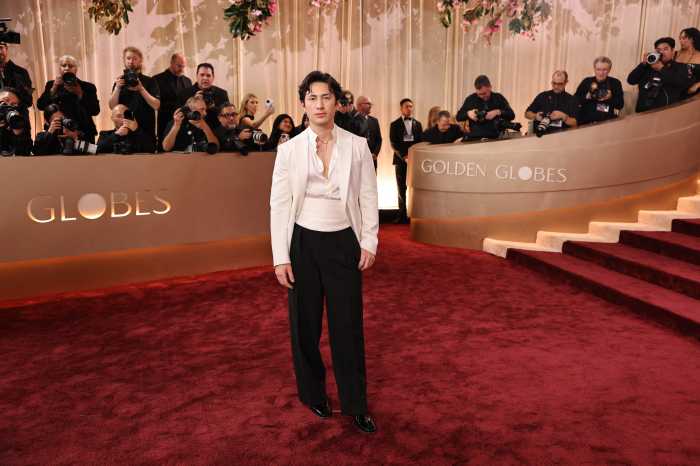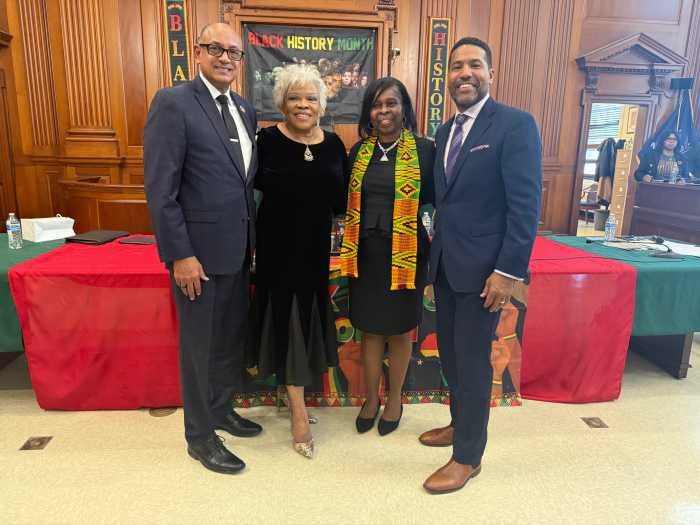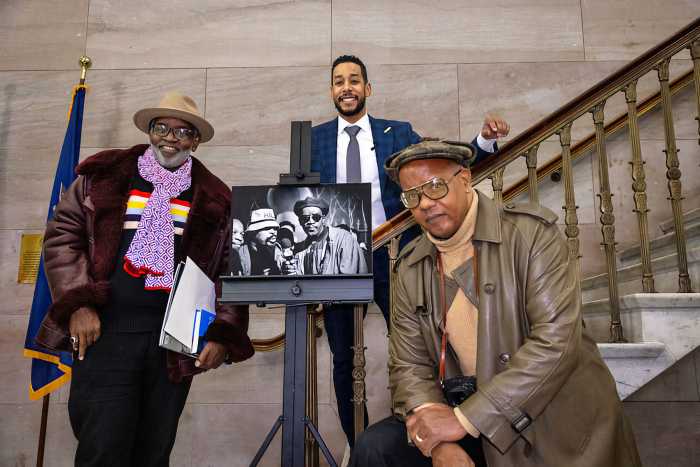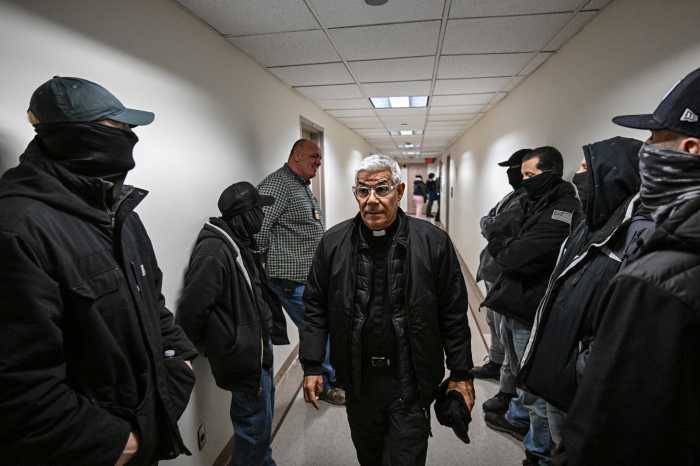At this year’s Toronto International Film Festival, there were premieres of dozens of LGBTQ films. These included new features by acclaimed queer filmmakers Gus Van Sant, whose “Dead Man’s Wire” details a kidnapping in 1977, and Lucrecia Martel, who presented the documentary “Nuestra Tierra,” which examines the killing of an indigenous community leader in Northern Argentina, as well as Nicolas Hytner, whose historical comedy-drama “The Choral,” about a male chorus in England during WWI, features a screenplay by the out gay Alan Bennett and out gay actor Simon Russell Beale in a supporting role.
Here is a rundown of six queer-themed films plus a short that screened at this year’s Festival.
Hafsia Herzi’s “The Little Sister” is an outstanding coming-of-age story — it won the Queer Palm at Cannes earlier this year — about 17-year-old Fatima (Nafia Melliti), a French-born Algerian. Fatima projects a tough exterior that masks her internal conflict about being a lesbian. She is reluctant to commit to her boyfriend, who sees a future for them. She hangs out with guys at school and bullies a gay classmate when he clocks her as queer. Fatima starts investigating her sexuality by meeting women online to get both knowledge and experience. She soon connects with Ji-Na (Park Ji-Min) and begins an intense relationship with her. “The Little Sister,” which is based on Fatima Daas’ autofiction, traces Fatima’s life over the course of a year and includes a rollercoaster of emotions. Herzi’s intimate approach allows viewers to become as invested in Fatima as Melliti is in playing her. (The actress won Best Actress at Cannes for her performance.) Fatima has moments of queer joy at a Pride Parade and a lesbian nightclub, but also the pain of heartbreak. These scenes, and others, including Fatima trying to reconcile her religion and sexuality with an imam (Abdelah Manoun), build to an emotional chat Fatima has with her mother. “The Little Sister” is an empowering story of emancipation, marvelously rendered.
In the wistful, elegiac “Blue Moon,” the celebrated and closeted lyricist Lorenz Hart (Ethan Hawke) holes up in Sardi’s delivering a series of absorbing and occasionally amusing monologues. Hart is bitter that Richard Rodgers’ (Andrew Scott) new show, “Oklahoma!” — the first time he collaborated with someone other than Hart — is having its premiere this evening and going to be a smash hit. He is also hoping that Elizabeth Weiland (Margaret Qualley), a 20-year-old Yale student, will confirm that she has the same “irrational admiration” for him that he has for her. Hawke’s showboating (read: Oscar-baiting) performance is strongest when he has exchanges with Rodgers or Elizabeth, who see through his desperation, but he is entertaining holding court in the bar. Director Richard Linklater, working from a screenplay by Robert Kaplow that is based on Hart’s letters, never lets the pacing flag even though the film is often stagy. By the end of “Blue Moon,” viewers may not be as emotionally drained as Hart is after his long, wearying night but they will appreciate the raconteur.
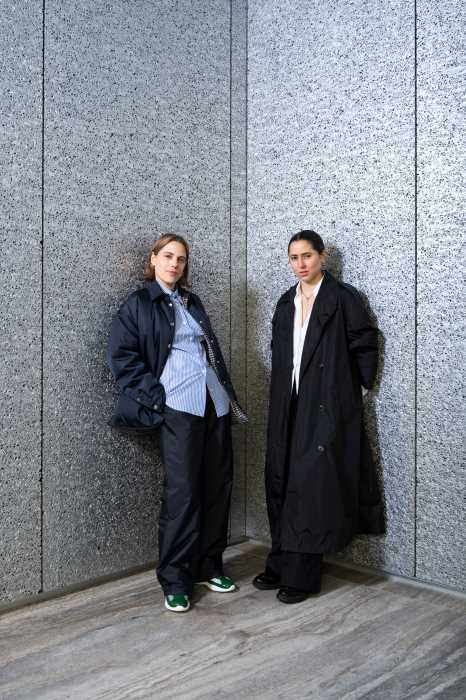
“Bouchra” is a gorgeous-looking 3-D animated film about the title character (voiced by Meriem Bennani), a queer coyote living in New York City. She periodically calls her mother, Aicha (Yto Barrada), who lives in Casablanca. Their relationship has not always been easy after Bouchra came out to her in a letter nine years ago. That event is now the basis for Bouchra’s film-within-a-film, featuring an actress (Dounia Berrada) playing Aicha. A heart-to-heart moment between mother and daughter — while Bouchra is cooking something — is extremely honest and affecting. Layered within these narratives are scenes of Bouchra hooking up with an ex, flirting with a potential new girlfriend, or hanging out with her friends. The plot casually unfolds, but the images are full of texture, rendered in vivid colors. (One striking sequence features a talking elevator floor; both Bouchra and Aicha share a fear of elevators.) This film, directed by Orian Barki and Bennani, is an engaging animated feature that captures the rhythms of Bouchra’s life with an emphasis on all the emotions she feels.
“Modern Whore” is an informative and entertaining Canadian documentary about Andrea Werhun, who wants to normalize sex work. She recounts her experiences working first as an escort, and later as a stripper, because these jobs were more lucrative than a minimum-wage gig. She found her work to be empowering and exciting at times, but it also had its drawbacks, with clients either falling in love with her or sexually assaulting her. Werhun is a very savvy and engaging presence, and she doubles — in male drag — as “Shame,” that nagging voice that stigmatizes what she does and the choices she makes to provide insights into topics such as sober sex work.
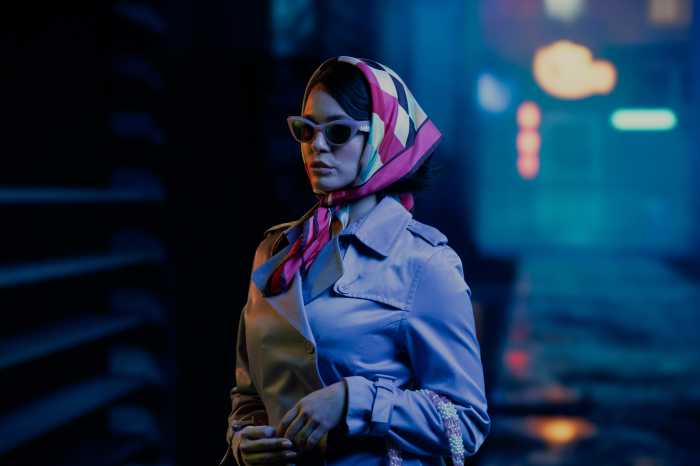
“Modern Whore” also places Werhun in conversation with other sex-worker friends, including the gender diverse SJ Raphael and a former escort, the non-binary Kitoko Mai, who discuss their experiences with clients, race, and boundaries. With reenactments and animation used to illustrate some of Werhun’s on-the-job situations, director Nicole Bazuin’s film aims to destigmatize women who perform sex work and not make them into victims or villains. It is a shrewd, and non-judgmental look at an individual and an industry that deserves respect.
“Sk+te’kmukue’katik (At the Place of Ghosts)” opens with Mise’l (Blake Miranda), a two-spirit individual, having an encounter with a ghost that both scars him and scares him. He tells his boyfriend, Barry (Alexander Nunez), that he needs to go home to his Mi’kmaw community to “deal with stuff.” That “stuff” is an unresolved past trauma that haunts both Mise’l and his brother, Antle (Forrest Goodluck of “The Miseducation of Cameron Post”).
As the siblings venture into the forest looking for a cave, they see versions of their younger selves, run into wild animals, experience sickness, and meet various strangers and healers. Written and directed by two-spirit Bretten Hannam (“Wildhood”), “Sk+te’kmukue’katik (At the Place of Ghosts)” is an interesting (ghost) story about resilience and endurance that offers an allegory for Indigenous people. Beautifully lensed, the episodic film is a bit uneven; some vignettes, like a run-in with colonial British soldiers, are more compelling than others, as when the guys happen upon a group of religious men. Nevertheless, there is value in the depiction of a history and culture that is too rarely seen on screen. Both Miranda and Goodluck are compelling and have a good rapport, however, the queer content here is mostly downplayed.
“A Useful Ghost,” is a fabulous, auspicious debut by Thai writer/director Ratchapoom Boonbunchachoke. (It is Thailand’s Oscar submission for Best International Film). Academic Ladyboy (Wisarut Homhuan) buys a vacuum cleaner and discovers the machine is possessed by a ghost. Enter the adorable Krong (Wanlop Rungkumjad), a repairman, who recounts the story of two ghosts. One is Tok (Krittin Thongmai) a dead factory worker who had a secret male lover, Pin (Wachara Kanha). The other ghost is Nat (Davika Hoorne), the late wife of March (Wisarut Himmarat), the son of Suman (Apasiri Nitibhon), the owner of the factory where Tok died. The ghosts are “useful,” and it is a sign of Boonbunchachoke’s irreverence that March is pleasured by the brush of the vacuum Nat inhabits in one amusing scene. However, Boonbunchachoke is also being quite political. A minister, Dr. Paul (Gandhi Wasuvitchayagit) employs Nat to enter people’s dreams to erase their memories using electroshock treatments. (It is easy to read this as a metaphor for conversion therapy, but it references the 2010 massacre.) “A Useful Ghost” is both clever and stylish as it explores issues of memory, truth, and forgiveness as Boonbunchachoke delivers an entrancing story about love, death, and ghosts, with a smattering of gay sex.
The short film “Talk Me,” by Joecar Hanna, has fun building a world where people interact by kissing or having sex — on streets, in stores, on buses; even at a wedding, two guys are humping at a table in full view. But why all this intimacy and affection is taking place soon becomes clear — talking is taboo. So, too, is music. But Pedro (Hanna) wants to listen to a song he loves, and because his boyfriend, Fernando (Carlos Gorbe), does not, it causes another rift in their fragile relationship. When Pedro meets Kira (Melanie Smith), who signals to him she appreciates the song he does, they begin meeting in secret. “Talk Me” is an unusual, experimental film that has a lot to say about communication (or lack thereof) and it showcases Hanna’s talents in front of and behind the camera well.

